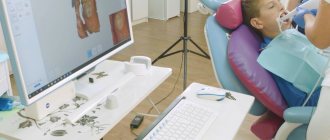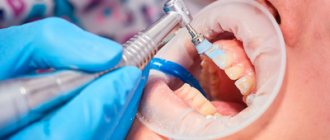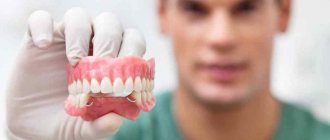When studying the price list of any dental clinic, patients see something like the following:
If everything is more or less clear with the first and last points, then what about an orthopedic dentist, periodontist, implantologist and orthodontist? Who are they and what do they do? And which of them wears dentures?
Everything is simple here:
- Dentist-therapist: treats caries, pulpitis and periodontitis, puts fillings. Works with tooth root canals. In our clinic, therapists are trained in artistic dental restoration.
- Dentist-surgeon: removes teeth, performs tooth-preserving operations. If he has the necessary knowledge, he carries out the surgical part of dental implantation - the direct installation of the implant.
- Orthopedic dentist: deals with dental prosthetics. Crowns, inlays, removable dentures are his element. Orthopedic dentists also perform prosthetics on implants that are pre-installed by his colleague, a dental surgeon.
- Dentist-periodontist: gum disease is the domain of the periodontist. Bandages, mouthguards, ointments are his arsenal. Performs hygienic cleaning of the oral cavity (tartar removal, Airflow). In difficult cases, he performs operations on the gums (periodontics is a discipline related to surgical dentistry).
- Implantologist: deals with the installation of dental implants and subsequent prosthetics on them. Sounds familiar? That's right, a dental surgeon and an orthopedic dentist can do the same thing, working in tandem.
- Orthodontist: corrects bites for adults and children. His tools are plates, trainers, and bracket systems. As a result, orthodontic patients receive straight teeth and their correct alignment.
- Pediatric dentist: deals with the treatment and removal of baby teeth, silvering. It can promptly prompt parents that it is time for their child to see an orthodontist in order to solve a bite problem at an early age.
Do you need to get a higher education?
It should be noted that not all dental specialties require higher medical education. This, by the way, is the difference between dentists and dentists. Dentists, regardless of specialization (therapy, surgery, including maxillofacial, periodontology), must have a higher medical education. Dentists are traditionally called specialists who have received secondary medical education and then studied for another three years with a dentist. This term is actively used in Europe and North America, and in Russian conditions it is more often used to refer to specific specialties - for example, dental paramedic or dental technician.
Principles of training
If you decide to become a dentist, then you need to understand that this profession is very responsible. Therefore, it is necessary to obtain a medical education.
Those who are interested in dentistry are wondering: how long to study to become a dentist and what is needed for this. To enter a university, you must:
- complete 11 grades in a secondary school;
- pass the appropriate exams in biology, chemistry and Russian.
It is necessary to understand whether a person is ready for this profession. To obtain a specialty in this field, you need good study and a specific goal, as well as the ability to find an approach to even the most picky and harmful patients.
How to become a dentist?
In order to become a dentist, and not just a dentist (dental technician), you need to graduate from a medical school. The duration of study is currently 5-6 years depending on the university. After receiving a diploma, the young specialist will need to undergo residency or internship training - only then will he be able to receive the appropriate certificate, which will give him the right to work as a dental therapist, maxillofacial surgeon, orthopedist or periodontist. But in the future, the dentist will constantly have to learn - improve his skills, attend conferences and seminars on new techniques and drugs. Some dentists may eventually open their own clinics or pursue a scientific career - both of which are considered quite prestigious.
Orthopedist
Patients who have lost one or more units of dentition turn to this specialist. The doctor will help people who have ugly stumps sticking out instead of teeth, causing injuries to the mucous membrane.
What does an orthopedic dentist do:
- performs full or partial prosthetics;
- restores the beauty of a smile;
- selects the optimal method for normalizing chewing function.
Important! Before consultation with a prosthetist, it is mandatory to sanitize the oral cavity and eliminate inflammatory processes of various etiologies. A visit to the dentist or dental therapist is the first stage of orthopedic treatment.
Requirements for a dentist
Employers do not have many formal requirements for dentists. In addition to a higher education diploma, such a specialist must also have the above-mentioned certificate and a medical book.
As for the personal qualities of the dentist himself, such a specialist is required to:
- attentiveness, ability to see details,
- responsibility, as for doctors of any other specialty,
- analytical and critical thinking,
- resistance to stress, since you have to work with a variety of people and cope with problems of a high level of complexity (especially for surgeons),
- ability to empathize,
- good communication skills - this helps to win over the patient and facilitates the treatment process (it’s no secret that many people are simply afraid to go to the dentist),
- good fine motor skills.
It is clear that all these qualities must be combined with love for your profession, only then will it be possible to achieve success in it.
Resume sample
To find a job faster, you need a resume that can be sent to several companies at once. You need to know how to compose it correctly.
The resume must include:
- Full Name;
- Date of Birth;
- contact details: phone, email;
- citizenship;
- experience;
- basic and additional education;
- professional skills;
- knowledge of languages;
- personal qualities.
The resume should be simple and understandable; there is no need to write or invent a lot, because then in practice all the qualities and abilities of the specialist will be assessed.
Pros and cons of the profession
Like any other occupation, this profession has its pros and cons. Its advantages include:
- consistently high demand in the labor market,
- high level of payment,
- good career prospects, especially in science,
- opportunity to open your own business.
However, it also has its drawbacks. This is a great responsibility, and the need to work in a stressful situation, and some monotony of professional activity. Also worth mentioning is the high cost of medical education and further training.
Implantologist
Implantology is a narrow specialization of dental surgery. An implantologist restores missing teeth in the mouth by implanting artificial roots (implants) into the jaw bones. Problems solved by an implantologist:
- absence of one or more teeth in a row;
- complete edentia;
- atrophy of the jaw bone.
The implantologist works in close collaboration with the orthopedist, since after implantation the patient is sent to the orthopedic office for prosthetics.
Main dental specialties
If a person wants to become a dentist, then sooner or later he will need to choose a specific specialization. Below they will be discussed in more detail.
Dentist-therapist: main responsibilities
This specialist provides general treatment. He conducts an initial consultation,, if necessary, refers patients for x-rays, prepares them for prosthetics, and treats certain diseases. This is the most common specialty. Everyone has encountered a dental therapist in their life, since such specialists perform the following tasks:
- carry out treatment of caries, nerve inflammation, periodontitis, gingivitis,
- carry out dental restoration,
- if indicated, teeth are depulped (that is, nerves are removed),
- Tartar is removed and teeth are whitened.
A dentist-therapist receives an average of 40-150 thousand rubles, depending on which clinic he works in - private or public. Such specialists usually have a stable income and flow of patients. Sometimes the workload increases - before winter holidays, summer vacations and the start of a new school year.
In public clinics, dental therapists can receive bonuses for length of service and having an academic degree. In private offices, dental therapists also have to engage in ongoing postgraduate education. And the more diplomas you have, the greater your chances of getting a job in a good clinic. And there the salary mainly depends on the number of patients.
Orthopedic dentist: main responsibilities
This is a specialist who deals with prosthetics and restoration of teeth (or the jaw as a whole). It also helps to form a correct bite, eliminates the consequences of injuries and other pathologies of the periodontium and pulp.
An orthopedic dentist deals not only with teeth and gums, but also with pathologies of the tongue and mucous membrane. The competence of an orthopedist also includes problems such as caries, pulpitis, erosion, and dental injuries. The average income level of representatives of this specialty is much higher than that of orthopedic dentists, but the tasks they face are more complex.
Orthodontist: main responsibilities
Today, orthodontics is a dynamically developing branch, which is considered one of the most complex in modern dentistry. For the most part, it is associated with the correction of aesthetic defects, but since these problems can affect not only the patient’s self-esteem, but also his health, orthodontists are indeed faced with very difficult tasks. This specialist installs braces, correcting the bite (orthopedists use other methods for this), eliminates gaps between teeth, and removes curvature and irregularities.
Other professions: How to become a truck driver and make money?
It often turns out that the salary of an orthodontist in a particular clinic is small, so the same specialist can work in several clinics, because his services, although more expensive, are required less often than, say, the services of a therapist.
Dentist-periodontist: features of work
As the name of the profession itself suggests, such a specialist works with periodontium - the tissues surrounding the teeth and holding them in the bone, that is, he treats various gum diseases.
Dentist-periodontist:
- eliminates dental plaque,
- treats bleeding gums,
- Various medical techniques are used to eliminate halitosis (the so-called bad breath),
- carries out diagnosis and treatment of stomatitis, gingivitis and other inflammatory diseases.
Although some dental therapists often perform the same functions as periodontists, in reputable clinics they prefer a division of labor. Periodontists earn on average the same as general practitioners.
Dental surgeon: features of work
The surgeon carries out more serious interventions - eliminates the consequences of dislocations and fractures of the jaw, removes jaw cysts, the “hood” over the wisdom tooth (in the presence of an inflammatory process), treats alveolitis, glossitis (inflammation of the tongue), infective endocarditis, works with abscesses, dental defects rows, etc.
In general, representatives of this specialty have a lower salary level than orthopedists, approximately at the level of dental therapists.
What do oral and maxillofacial surgeons work with?
Sometimes this area is referred to as plastic surgery, but in fact, these specialists have slightly different tasks, and they have nothing in common with aesthetic medicine. Oral and maxillofacial surgeons solve problems associated with difficult teething, certain diseases of the salivary glands, etc. For example, they remove tumors that have formed in the oral cavity.
The average income of such specialists is also relatively low, despite the fact that they are engaged in extremely delicate and complex work.
Pediatric dentist: main responsibilities
In essence, such a specialist does the same thing as a regular dental therapist, but he only works with children under 14 years of age. And at the same time, his responsibilities also include correcting malocclusion and the functioning of the chewing apparatus, as well as adjusting oral hygiene.
Although this specialist deals with standard tasks, working in this area is more difficult, because not every doctor, no matter how wonderful a professional he may be, can find an approach to such small patients. Meanwhile, his salary level is the same as that of a dental therapist.
Responsibilities of an orthodontist
Another narrow area of modern dentistry is orthodontics. Sometimes such an expert is called an orthopedist, but it would be more correct to call an orthodontist. He has to cope with aesthetic tasks.
With the help of accumulated knowledge and skills, the doctor easily corrects both natural anomalies and those pathologies that arose much later. The first group includes incorrect position of the teeth, which provokes an incorrect bite.
He is also able to correct the entire dentition, no matter what natural characteristics the applicant has from birth. The only question is how much such an intervention will cost.
The orthodontist's main secret weapon is special braces. Today, their variety is so wide that some models seem almost invisible against the backdrop of older, massive offerings.
Despite the stereotype that braces or other aids for correcting malocclusion and crooked teeth are the privilege of children, this has not been the case for a long time. Modern methods help correct errors of nature at almost any age. The difference lies only in the percentage effectiveness of the technique, which usually works somewhat worse for adults than for schoolchildren.
How much do dentists of different specialties earn?
Pay levels for dentists in different specialties can vary significantly, even within the public or private sector alone.
How much does a dental therapist earn?
The average salary of a representative of this specialty is 50 thousand rubles per month. At the same time, the demand for dental therapists remains consistently high in both the public and private sectors, but the most vacancies are open in Moscow. St. Petersburg, Krasnodar, Saratov, Krasnoyarsk, and Volgograd are not far behind in this indicator.
It is interesting that the work of dental therapists is best paid not in Moscow. The leader, according to official statistics, is the Ulyanovsk region and the Republic of Karelia, where a dentist-therapist receives up to 100 thousand rubles per month (on average).
Dental therapists working in the northern regions traditionally have a high level of income. For example, in the Khanty-Mansiysk Okrug, the average salary for representatives of this specialty is almost 77 thousand rubles per month. In Moscow and St. Petersburg, the average salary of dental therapists is 60-63 thousand rubles per month. But this figure also takes into account the income of specialists in private clinics, so in practice the wage gap can be quite large.
Salary examples
How much does an orthopedic dentist earn?
The average salary of representatives of this specialty is almost 89 thousand rubles per month. At the same time, the distribution of vacancies here will be approximately the same as for dental therapists, that is, the greatest demand for specialists is recorded in the capital.
At the same time, the highest level of income, according to official statistics, is among those representatives of this profession who live in the Tyumen region - about 178 thousand rubles per month.
Examples of positions
The average salary in Moscow is 110 thousand rubles. Interestingly, in Krasnodar it is higher – 138 thousand rubles. In St. Petersburg, Omsk, Yekaterinburg, the salary level is 100 thousand rubles, but it is clear that in many small cities the income of such specialists will be significantly lower.
How much does an orthodontist earn?
The average monthly income for a representative of this specialty is 72 thousand rubles. Orthodontists are most in demand in Moscow and St. Petersburg, as well as in several cities with a population of over a million. Apparently, because in small towns issues of aesthetics are treated much more simply.
But according to official statistics, the highest salary level is for orthodontists working in the Republic of Bashkortostan. Here they receive about 100 thousand rubles a month, while in Moscow the average salary is only about 70 thousand rubles. In most cities, the average monthly income of such specialists is 50-60 thousand rubles.
Other professions: How much do architects get paid?
Salary with examples
How much does a periodontist earn?
The average salary of a periodontist is 60 thousand rubles per month. The largest number of vacancies for representatives of this profession are open in Moscow and the capital region. Actually, in Moscow such a specialist receives 70 thousand rubles (and in private clinics even more). In St. Petersburg, the average salary is 50 thousand rubles. In Irkutsk, Chelyabinsk, Tomsk, such a specialist earns on average 40 thousand rubles per month.
How much does a dental surgeon earn?
The monthly salary of such a specialist is 60 thousand rubles. It is interesting that many vacancies in this specialty are open not only in Moscow, but also in Krasnoyarsk, St. Petersburg, and Nizhny Novgorod. The average income of such a specialist in Moscow is 74 thousand rubles, but in the North, dental surgeons receive more - for example, in Khabarovsk, according to official statistics, the salary level is about 100 thousand rubles, in the Yamalo-Nenets Autonomous Okrug - 80 thousand rubles. In most other regions, the average income of a dental surgeon does not exceed 50 thousand rubles.
Examples of vacancies
How much does an oral and maxillofacial surgeon earn?
The average salary of such a specialist does not exceed 40 thousand rubles in the country. At the same time, in the capital, representatives of this specialty, according to official data, earn about 45-50 thousand rubles, and this takes into account private clinics, where they are often registered part-time. In Novosibirsk the average salary is 35 thousand rubles, in Chelyabinsk – 25-30 thousand rubles.
How much does a pediatric dentist earn?
The monthly income of a specialist in this area is 50 thousand rubles. The most vacancies in this specialty are open in Moscow and St. Petersburg. However, the highest salaries are offered to pediatric dentists in the northern regions. For example, in the Nenets Autonomous Okrug they receive more than 112 thousand rubles per month, in Khabarovsk - 107-108 thousand rubles per month. In Moscow, the income level is 70 thousand rubles per month, but, for example, in Kursk, Penza, Yaroslavl, it is already 60 thousand.
Examples of vacancies
Which dentists are in demand in Moscow?
Principles of remuneration in public and private clinics
The difference between private and public dentistry in remuneration can be quite significant. For example, in the capital, a dental therapist in a public clinic receives 50-60 thousand rubles , but in a private clinic, all other things being equal, he will receive 80-120 thousand rubles. In public medical institutions, a dentist’s salary consists of the official salary and various allowances. Among other things, such specialists receive additional payments for qualification categories, for a scientific degree (if any), etc.
In private clinics, salaries are calculated differently. At the same time, such institutions often compete with each other for good specialists, so everyone pays high salaries, and additionally attracts staff with good working conditions - a social package, modern equipment and optics, the presence of assistants, etc.
As a rule, if a dentist does not open his own office, but goes to work as an employee, then a plan for services is set for him, or more precisely, for their total amount. Depending on this, he receives the initially established percentage. At the same time, good clinics set a very realistic plan, taking into account the experience of previous months, and it is not difficult to implement it.
Salary for percentage
Pricing is usually determined by the clinic’s management. But in general, the price of relatively simple manipulations is determined by the cost of the materials used, to which a certain markup is added. However, in some areas of dentistry, the so-called technical cost of work is used - this is, for example, relevant for crowns and veneers, which are made not by the dentist himself, but by a dental technician. In this case, the percentage for calculating the salary of the dentist-therapist will be calculated a little differently. The markup itself can be almost any amount. In private clinics, it includes both payment of taxes and salaries of all staff, so it can be 200% or more.
Gray additional methods earnings
It also happens, of course, that not very conscientious doctors impose additional services where they could have done without it (mostly this concerns some aesthetic problems or professional oral hygiene services, but in general in reputable clinics this rarely happens).
Bonuses and awards
Most private clinics do not offer additional bonuses or bonuses. But some institutions practice training employees in courses and seminars at their own expense, and there are also those that include meals for employees in their benefits package.
Penalties
But there is a system of fines. Basically, they fine small sums for various violations of labor discipline - for example, for being late or for untimely filling out medical documentation. If the doctor makes any mistakes in treatment, then more stringent measures can be taken.
When working in a private clinic, you need to keep in mind that although the registration will be official everywhere, the management still wants to save on taxes. Therefore, many register as part-time doctors in order to minimize their contributions to the tax and pension fund.
Other professions: What is the salary of an auto mechanic?
conclusions
There are a lot of specialists in dentistry, and the activities of each of them are different. It is important to remember that you can avoid serious oral health problems and trips to dental clinics if you follow the basic rules:
- brush your teeth twice a day;
- visit the dentist once a year, even if there is no reason for this;
- Do not delay your visit if your gums become sensitive or inflamed.
By following these conditions, you will protect yourself from problems in the future. Do not be afraid of doctors; many diseases begin completely asymptomatically, and only a specialist will be able to identify the threat in time.
What do you need to know about working in a private clinic and your own office?
Despite the fact that such work brings more income, it is associated with certain nuances that you need to be aware of when choosing a certain type of activity. For example, in a private clinic, doctors must first familiarize themselves with corporate standards; some even introduce a dress code. And when opening your own office, you need to spend a lot of money and time to bring everything into compliance with the standards prescribed in laws and regulations.
Dentist advertising and job search
For a dentist, reputation is very important when looking for a job. Therefore, he can gain experience in a state clinic, so that he will soon be able to receive good recommendations. In addition, there are special professional groups on social networks where dentists can post photographs of their most successful work. This can be considered a kind of self-promotion, so that in the future you can refer to this portfolio during an interview. Of course, photographs need to be protected with watermarks, since such works can simply be stolen.
Working with social media networks
Owners of private accounts can actively promote their services on social networks, but in groups aimed at consumers. For example, you can use Instagram as a tool by tagging relevant hashtags. This technique is considered especially effective for orthodontists who primarily offer aesthetic medicine services.
Work schedule in a private clinic or your own office
Many people believe that private clinics have more flexible hours than public clinics. Actually this is not true. Very often it is scheduled several days in advance and without any “windows”. In addition, many clinics are open six to seven days a week to accommodate those patients who cannot make an appointment on weekdays. But private clinics are good because they have more time to see patients, the doctor can plan a lot himself, and as a result he works at a more comfortable pace.
How much does a dentist earn in Western countries?
USA
In the US, most dentists have their own private practice, for which they need to obtain a license. The salary level is up to $80 per hour and up to 140 thousand dollars per year - this is a whole industry here.
Germany
In Germany, a dentist can earn up to 6,000 euros per month, and this is before taxes. However, this mainly applies only to experienced specialists, and beginners receive up to 3,500 euros. In East Germany, income levels are much lower; here, even an experienced doctor can only earn 4,500 euros. In England, a dental therapist earns at least 7.5 pounds per hour. The annual income of such a specialist is 97-98 thousand pounds.
Canada
Categories of dentists
Dentists are required to confirm their qualifications every 5 years
Each dentist has a certain qualification category, which is an indicator of the level of his theoretical knowledge and practical skills.
The procedure for assigning a qualification category is determined by order of the Ministry of Health of the Russian Federation.
Dentists are required to confirm their qualifications every 5 years.
Those who wish to improve their qualifications themselves must wait 3 years from the date of the last certification.
Regulatory documents provide for three types of categories in ascending order:
- second (is basic);
- first;
- highest.
Requirements for various categories:
| Category | Requirements |
| Second | Work experience in the specialty for at least 3 years. Successful completion of certification. |
| First | Work experience in the specialty for at least 7 years. For a specialist with secondary education – at least 5 years. Successful completion of certification. |
| Higher | Work experience in the specialty for at least 10 years. For a specialist with secondary education – at least 7 years. Successful completion of certification. |
Reviews
- No. 1. Becoming a dentist requires a certain amount of persistence and determination. It took me a total of about 8 years to study, and I didn’t even count how many times I attended various seminars and conferences after receiving my diploma (well, there were already courses twice). I didn’t immediately understand what direction I wanted to work in, and only after the internship I came to the conclusion that I would be a pediatric dentist. Working with such patients is not easy, but there are more positive emotions. After the appointment, I always give my patients some kind of souvenir - soap bubbles or balls with the symbols of our clinic, and on my own behalf - certificates for bravery, I simply print them out on a printer. I work in a private clinic, the salary is 80-90 thousand rubles per month. Our team is good, overall I’m happy with everything.
- No. 2. I myself work as a dental surgeon, and my wife is a dental therapist. When we had the opportunity, we opened our own office. It wasn’t easy, and it wasn’t even a matter of finding clients; we literally lured many away when we left our previous place of work. It’s just that organizing an office is an expensive pleasure, considering all the standards. We try not to raise the markup too much in order to retain customers - the competition is still quite strong, and we set aside part of the money for upgrading equipment, so my monthly salary is 77-80 thousand rubles, my wife gets about the same (75 on average ).










